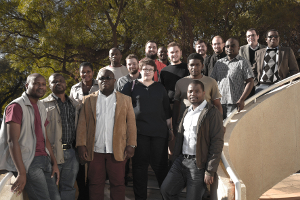Latest News Archive
Please select Category, Year, and then Month to display items
19 November 2018
|
Story Charlene Stanley
|
Photo Charlene Stanley
 Prof John Mubangizi, Dean of the Faculty of Law, encouraged delegates at the Fifth Annual International Mercantile Conference to share ideas on best international practice in their various fields.
Prof John Mubangizi, Dean of the Faculty of Law, encouraged delegates at the Fifth Annual International Mercantile Conference to share ideas on best international practice in their various fields.
“Don’t say anything online that you wouldn’t want plastered on a billboard with your face on it.”
This famous quote by international tech expert Erin Bury should be a guiding light when it comes to online habits in the workplace, according to Francois Cilliers, UFS Lecturer in Mercantile Law.
In his presentation Could Social Media be the Gateway to Employment Discrimination? he warned that employees have a responsibility not to bring their employers in disrepute through their comments on social media.
“Posts, updates, tweets, and comments are considered to be publications and can therefore never be seen as privileged information,” he explained.
Responsibility on employees and employers alike
He pointed out that employers also had a responsibility regarding the way in which they use the information about prospective employees obtained via social media.
“Nowadays, approximately 75% of companies hire through social media. In the US, recruiting companies spend hours researching candidates, making full use of what they can find on social media. It was found that 50–80% of employers frowned upon posts and pictures featuring drug and alcohol abuse, profanity, and bad grammar.”
He warned that employers needed to tread lightly, as a decision not to employ someone as a result of information on the prospective employee’s political views and sexual orientation could constitute unfair discrimination as set out in the Employment Equity Act.
“An employer who wishes to use a screening process (utilising social media) has to prove that the information and the process is objectively necessary and can be justified with reference to the inherent requirements of the job,” he explained.
“As technology and electronic systems advance, so too should the applicable labour laws.”
Cilliers’ presentation formed part of the Fifth Annual International Mercantile Law Conference recently hosted by the Faculty of Law on the Bloemfontein Campus.
Incorporating new technology in teaching and research
“This conference is an opportunity to share ideas on best practice in what is perceived as a ‘difficult’ field within Law,” said Prof John Mubangizi, Dean of the Faculty of Law, as he opened the proceedings. Topics in the discussion sessions ranged from Racism in the workplace and The underrepresentation of females in the judiciary, to Decriminalisation of cannabis: A recipe for healthy employer-employee relations?
“Conferences such as these help us to take advantage of the newest developments in technology to advance our teaching and research,” said Prof Mubangizi.
“To quote Einstein: ‘We can’t solve problems by using the same kind of thinking we used when we created them.’”
UFS International Studies Group makes history come alive globally
2015-07-15

The UFS International Studies Group comprises students who are top achievers drawn from South Africa, Southern and Central Africa and even further afield.
Photo: Charl Devenish |
Headed by Prof Ian Phimister, the UFS International Studies Group comprises six master’s, twelve PhD and twelve postdoctoral fellows who concentrate their research endeavours on African, Imperial and Global History. All of these students are top achievers drawn from South Africa, Southern and Central Africa and even further afield. This group, now only in its third year, presents a phenomenal research output with an international reach.
In the course of the past year alone, five PhD students secured fully-funded invitations to conferences and research seminars in South Africa, Britain, as well as the Netherlands. Our researchers have been publishing articles globally and securing visiting fellowships and research awards.
Dr Clement Masakure and Dr Rosa Williams won funding to present papers at the International Network for the History of Hospitals. Tinashe Nyamunda won a prestigious three-month Cadbury Fellowship at the University of Birmingham in the United Kingdom. Anusa Daimon has been selected as a 2015 Harry Guggenheim award winner, which covers workshop attendance in Nairobi, Kenya.
From among the group, twelve articles have been published or accepted for publication in refereed scholarly journals, as well as four chapters in edited books. Book reviews written by these highly-motivated graduate students, have appeared or will appear in leading national and international academic journals. Remarkably, seven book reviews appearing in one particular issue of African Studies Review, were written by this group. Four scholarly monographs have recently been published, or soon will be. One PhD student is the joint editor (with a senior Canadian academic) of a forthcoming study on Zimbabwe’s controversial Marange diamond mining industry.
Another outstanding researcher, Dr Lindie Koorts, won the award for the best debut writer at the 2014 Woordfees for her book ‘DF Malan and the Rise of Afrikaner Nationalism’ – the first non-fiction writer to achieve this. Her book now appears on the longlist for the 2015 Alan Paton Award.